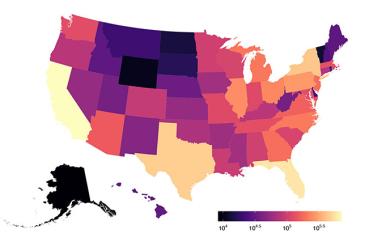Newly published research suggests that a specific diet called the MIND diet may reduce the incidence of brain disease that increases a person’s risk in developing Alzheimer’s disease.
The recent study shows that the MIND diet lowered the risk of Alzheimer's by as much as 53 percent in participants who adhered to the diet rigorously, and by about 35 percent in those who followed it moderately well according to a paper published online on March 19 in the journal Alzheimer’s & Dementia: The Journal of the Alzheimer’s Association.
Developed by Martha Clare Morris, PhD, a Rush nutritional epidemiologist and her colleagues, the MIND diet is a hybrid of the Mediterranean and DASH (Dietary Approaches to Stop Hypertension) diets. Both diets have been found to reduce the risk of cardiovascular conditions, like hypertension, heart attack and stroke. Some researchers have found that the two older diets provide protection against dementia as well.
The MIND diet is also easier to follow than, say, the Mediterranean diet, which calls for daily consumption of fish and three to four daily servings of each of fruits and vegetables, Morris said.
What's brain-healthy, what's not?
The MIND diet has 15 dietary components, including 10 “brain-healthy food groups:”
- Green leafy vegetables
- Other vegetables
- Nuts
- Berries
- Beans
- Whole grains
- Fish
- Poultry
- Olive oil
- Wine
The five unhealthy groups are:
- Red meats
- Butter and stick margarine
- Cheese
- Pastries and sweets
- Fried or fast food
The MIND diet includes at least three servings of whole grains, a salad and one other vegetable every day — along with a glass of wine. It also involves snacking most days on nuts and eating beans every other day or so, poultry and berries at least twice a week and fish at least once a week. Dieters must limit eating the designated unhealthy foods, especially butter (less than 1 tablespoon a day), cheese, and fried or fast food (less than a serving a week for any of the three), to have a real shot at avoiding the devastating effects of Alzheimer's, according to the study.
Blueberries are 'potent'
Berries are the only fruit specifically included in the MIND diet. “Blueberries are one of the more potent foods in terms of protecting the brain,” Morris said, and strawberries have also performed well in past studies of the effect of food on cognitive function.
“One of the more exciting things about this is that people who adhered even moderately to the MIND diet had a reduction in their risk for AD,” said Morris. “I think that will motivate people.”
Morris and her colleagues developed the MIND diet based on information that has accrued from years’ worth of past research about what foods and nutrients have good, and bad, effects on the functioning of the brain over time. This is the first study to related the MIND diet to Alzheimer’s disease.
Alzheimer's disease, which takes a devastating toll on cognitive function, is not unlike heart disease in that there appear to be “many factors that play into who gets the disease,” including behavioral, environmental and genetic components, Morris said.
“With late-onset AD, with the older group of people, genetic risk factors are a small piece of the picture,” she said. Past studies have yielded evidence that suggests that what we eat may play a significant role in determining who gets AD and who doesn’t,” Morris said.
When the researchers in the new study left out of the analyses those participants who changed their diets somewhere along the line — say, on a doctor’s orders after a stroke — they found that “the association became stronger between the MIND diet and (favorable) outcomes” in terms of Alzheimer's disease, Morris said. “That probably means that people who eat this diet consistently over the years get the best protection.”
In other words, it looks like the longer a person eats the MIND diet, the less risk that person will have of developing Alzheimer's, Morris said. As is the case with many health-related habits, including physical exercise, she said, “You’ll be healthier if you’ve been doing the right thing for a long time.”
The study was funded by the National Institute on Aging. All the researchers on this study were from Rush except for Frank M. Sacks MD, professor of cardiovascular disease prevention, Department of Nutrition, at the Harvard School of Public Health. Sacks chaired the committee that developed the DASH diet.




